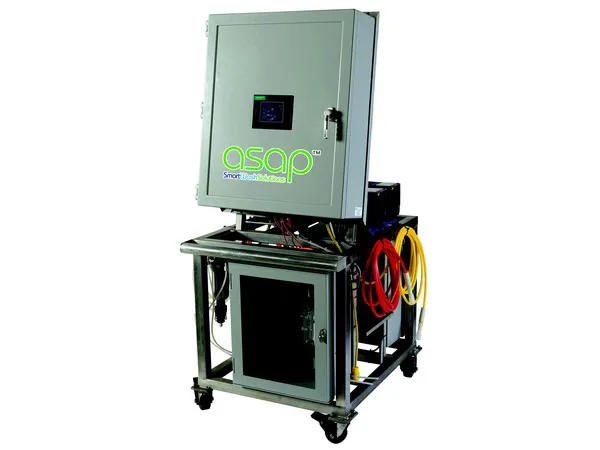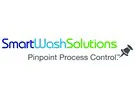The recent E.coli outbreak in the romaine lettuce in the United States shows that there is still room for improvement in the way produce is washed and processed prior to landing on the shelves of stores and on the plates of consumers. A 2006 outbreak of E.coli in spinach led Taylor Farms to begin focusing on developing an improved washing method to prevent similar outbreaks in the future. This led to the development of SmartWash Solutions LLC, which works as an independent business unit of Taylor Farms, and is celebrating its 10-year anniversary this year.
Unique method
Ewoud Buter joined the company almost 3 years ago to develop the European market and has been met with great enthusiasm in this endeavor. “The SmartWash Solution is a really unique method, and many companies here in Europe are really excited about it. We have developed our own processing aid called SmartWash, which replaces the citric acid that is used to regulate the water’s pH. The ingredients adhere specifically to microorganisms and targets and deactivates the harmful bacteria, such as E.coli, salmonella. We use this processing aid in combination with our Automated SmartWash Analytical Platform (ASAP) unit that continuously monitors the washing water’s temperature, pH levels, and hypochlorous acid (HOCl) levels and controls the pH and hypochlorous acid levels,” Buter explains.

The ASAP unit continuously monitors the washing water.
He continues: “In many manual washing processes, the wash operators check the water quality every hour to measure manually the pH and mostly times Total Chlorine (TC) instead of Free Chlorine (FC). Our unit measures every 10 milliseconds, and saves data points every 2 seconds – which gives the user access to 1800 high quality data points per hour, rather than just 1. On top of that, the unit is specifically calibrated to adjust the SmartWash and chlorinated disinfectant dosage based on the data readings, and this ensures that the correct pH levels and free chlorine (hypochlorous acid) levels are continuously maintained. Without this constant monitoring, there is a high chance for cross-contamination to occur. The washing process is the most important step for ensuring food safety.”
Improving efficiency in the process
SmartWash Solutions delivers a method that integrates Science, Engineering, and Technology. Buter says: “The Science is our SmartWash processing aid, the Engineering is our ASAP unit, and the Technology is the online platform called Process ProData Live (PPDL) that allows customers to check their data readings 24/7. Because the method integrates all these different aspects, and because it is different from any other washing method on the market, we offer extensive training to the users. It is really important that people in each part of the process understand not only how the method works, but also why it works and how it will benefit them.”
“One of the extras that this method delivers, beside ensuring food safety, is an increased efficiency in the washing process. The SmartWash processing aid causes the chlorine in the water to stay active longer, meaning that less water in used in the process over time. The method will make the wash line process more efficient, which allows factories to process more product every day, and have an advantage over their competition because the product they produce is very safe,” Buter adds.
Increase in demand due to recent outbreak in U.S.
With another E.coli outbreak appearing in the news recently, SmartWash Solutions is seeing an uptick in demand. Buter says: “With the current E.coli outbreak in romaine lettuce outbreak in the U.S., we are seeing that demand goes up for our washing method. The companies that are affected want to ensure that it can be prevented in the future, and often these outbreaks are due to cross- contamination in the washing process which leads to grand-scale spreading and a full-blown outbreak. So we are in conversations with companies that aren’t using SmartWash yet, but are being confronted with these outbreaks.
European regulations pose challenges
On a European level there are strict laws about the chlorates. “There are currently discussions about chlorates and the possible dangers they pose. The MRLs in Europe are really low, even lower than they are for the drinking water. This poses challenges for European factories and has an indirect effect on our business, even though we decreased the ppm levels of chlorates in each of our trials."
SmartWash Solutions is based in Salinas, CA. While the company also has an office in the Netherlands, the method actually cannot be used there due to strict regulations. “In the Netherlands, products can only be washed with pure water. This creates a lot of unfair competition because many other European countries do use chlorine and the big foodservice companies prefer a product that has been washed with chlorine to ensure its safety. And these products can still be sold in the Netherlands, so it is a bit crooked in that aspect. But we are working hard on possibly changing these laws and regulations so that we can introduce SmartWash here too,” Buter concludes.
For more information: 
SmartWash Solutions BV
Energiestraat 3
7442 DA Nijverdal
Tel: +31-6-15441290
Email: info@smartwashsolutions.com
www.smartwashsolutions.com
SmartWash® Solutions, LLC
1129 Harkins Road, Salinas, CA 93901
Tel: (+1) 831.676.9750
info@smartwashsolutions.com
